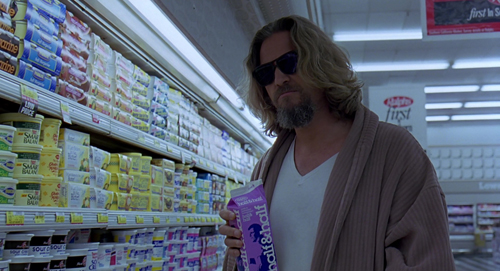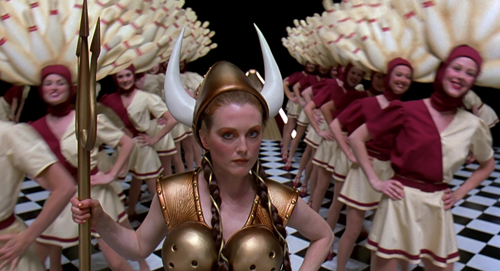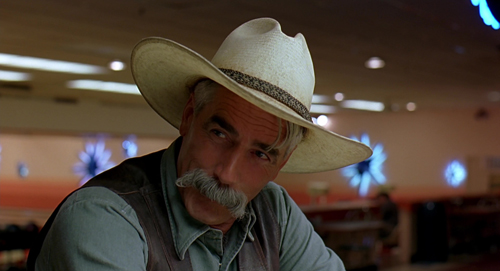
Your complimentary articles
You’ve read one of your four complimentary articles for this month.
You can read four articles free per month. To have complete access to the thousands of philosophy articles on this site, please
Films
The Big Lebowski
Matt Qvortrup contemplates Dude philosophy.
Maybe, just maybe, the meaning of life is to live it: to leave the worries to one side and, as in The Big Lebowski, say, “Fuck it… let’s go bowling” – or whatever pointless activity takes your fancy.
To assent to this idea, it must be said, is not to assert that the philosophy of The Big Lebowski (1998) can be reduced to a single insight. Indeed, it is in the nature of the true work of art that it contains many, often contradictory, stands. This film is no exception. Still, it is above all a funny film, with a perfectly cast Jeff Bridges as the antihero Jeffrey Lebowski, who answers to ‘the Dude’, or “his Dudeness, Duder, or El Duderino if you’re not into the whole brevity thing.” The film is not a treatise on practical philosophy, but an exuberant display of cinematographic playfulness, showcasing the directors’ effortless comic genius. Nor is this just a chronicle of the unemployed Lebowski’s descent into the underworld of early 1990s Los Angeles due to a case of mistaken identity. It is also (and perhaps even more so) a cacophony of small and seemingly unrelated events woven into a tapestry of the sublime and the ridiculous. How many movies begin with the main character writing a cheque for 69 cents?

The Dude samples the good life
The Big Lebowski images © Working Title Productions 1998
The Big Lebowski might have lent itself to a lazy rehash of the postmodern theories of Jean Baudrillard, who wrote about “the end of meta-narratives,” or what he saw as the extinction in the late 20th century of any grand overarching ideas about plans or purposes for human life. To be sure there are elements of this in the movie, as is perhaps natural given that it was made at the time when America was confronting Saddam Hussein (who is irreverently referred to as “that camel-fucker in Iraq” by Walter Sobchak, a cantankerous Vietnam vet played by John Goodman). But overall, for those who watch this movie with a philosophical eye, it is almost breath-taking how many references there are to non-post-modern thought; how the characters almost go out of their way to insist on meta-narratives, on purposes. For example, reflecting on nihilism (a concept not much discussed in other Hollywood blockbusters), Walter – a convert to Judaism – dismisses this anti-creed with characteristic bluntness: “Nihilists? Fuck me! … National Socialism… at least it’s an ethos.” And the self-same Walter notes that “this is not Nam, there are rules.” The Big Lebowski is not a movie based on the stringent logic of a René Descartes, still less one that portrays the ideals of the Enlightenment. But for directors Joel and Ethan Coen, The Big Lebowski was their first foray into Greco-Roman philosophy. They would later direct a remake of Homer’s Odysseus in the Deep South in Brother, Where Art Thou? (2000), and recently Hail Caesar (2016). Coen Brothers movies often contain philosophical references. In Hail Caesar, there is even a cameo appearance by Herbert Marcuse, the German émigré Marxist Professor, who talks about “Ze dialectic” to George Clooney’s hapless and very impressionable character. But The Big Lebowski is (perhaps unwittingly) their most complete rehearsal of philosophical themes.

The Dude’s No.9 dream
The Big Stoic
Is it just coincidental that Ethan Coen, who earned a BA in Philosophy at Princeton, endowed the Dude with such a strong dose of Socratic irony? If Socrates had lived in L.A. in the early 1990s, would he not have been a dude? A bearded, slightly overweight character, well-liked by his friends, a meditating ten-pin bowler with a resigned and irreverent attitude to life, he shares many of the characteristics of the Athenian sage portrayed in Plato’s earlier dialogues. And yet the Dude is not always a convincing Socrates. His philosophy is not that the unexamined life is not worth living, as Socrates famously asserted in Plato’s Apology. Rather, if this movie is anything philosophical, it is Stoic.
Stoicism can be summed up as a philosophy of how to face adversity with equanimity. Founded in Athens by Zeno of Citium in the Third Century BC, Stoicism taught that to live the good life one has to understand the natural order of things; that what happens to you is often beyond your control, but you can control how you respond to it emotionally. Not merely a practical philosophy, the Stoics were also pioneers of a propositional logic which some commentators consider to be close to the logic of Gottlob Frege (1848-1925). But these considerations, as well as their dualist metaphysics, were but means to an end – to develop a philosophy of the good and contented life. Having been established in Greece, where Epictetus further developed it in the Second Century BC, Stoicism was given a more popular form by Roman philosophers including Seneca (4 BC - 65 AD) and Rome’s philosophising Emperor, Marcus Aurelius (121-180 AD).
Like a good Stoic, the Dude is above all calm in the face of adversity. When two angry mobsters push his head into a toilet bowl and demand “Where’s the money, Lebowski?” he stoically responds, “It’s uh… it’s down there somewhere, let me take another look.” After the Dude has suffered no end of misfortune, the narrator of the movie, ‘the Stranger’ – a Texan with a Nietzschian moustache – observes that life goes on, and that we can still look to him for guidance: “Up and down, the Dude is out there taking it easy for all us sinners.” ‘Us sinners’ are caught up in a debilitating rat-race and would do better to emulate a lazy man – “and the Dude certainly was that.” “True happiness”, as Seneca observed, “is to enjoy the present, without anxious dependence upon the future” (Letters From A Stoic). And what constitutes contentment for the Dude is summed up in the words “bowl, drive around, and the occasional acid flashback” – in other words to live in the present and to be content with his lot. In this, the Dude is the very personification of Seneca’s definition of ‘the wise man’, someone who “is content with his lot, whatever it may be, without wishing for what he has not” (Letters). This is a man whose life centres around bowling; although he does care a little about replacing a rug that “tied the room together.”

The Stranger with the moustache
Core Dudeism
To claim that the Dude is a Stoic is clearly open to criticism (as all philosophy should be!). Philosophical analogies are never entirely accurate in works of art, and characters in movies are by definition larger and more multifaceted than the abstractions of philosophy. It should also be noted that the film has given rise to a semi-religious philosophy of a Daoist nature, often referred to as Dudeism. Jeff Bridges even co-authored a book about the philosophy of the film (Bernie Glassman and Jeff Bridges, The Dude and the Zen Master, 2014). But it is not the prerogative of the artist to interpret his work. It is for the spectator, not the actor, to draw lessons, find similarities, and take the longer view.
All analysis can become uninspiring if pushed too far. The beauty of art as a means of representing philosophical truths is that there are insights that can only be represented and understood in an artistic form; perceptions that somehow go beyond rational comprehension and scientific reductionism. While the sciences generally seek to break things down into their simplest parts, the humanities and the arts insist on the interplay of multiple perspectives, which can only be experienced through artistic expression. The cinematic arts are no exception. The Dude’s Stoicism is not of an abstract nature, nor is it adhered to with unfailing consistency. Greatness means to be so large that there is room for contradictions. The Dude is – if pressed – capable of anger, though often in a resigned fashion: “You’re not wrong Walter, you’re just an asshole!” And like Christ in the desert, the Dude is tempted to depart from his true inner beliefs. Egged on by Walter, he is lured by the promise of easy money; but in its pursuit he only finds himself at the mercy of nihilists and the occasional pornographer.
According to the early Stoic Epictetus,
“Philosophy does not promise to secure anything external for man, otherwise it would be admitting something that lies beyond its proper subject-matter. For as the material of the carpenter is wood and that of the statuary bronze, so the subject matter of the art of living is each person’s own life”
(Discourses 1.15).
To be inspired by and follow the Dude’s philosophy of life also does not promise to secure anything external. Finally bereft of both his friend Danny (played by Coen Bros. regular Steve Buscemi) and his beloved rug, the Dude returns to enjoying the quiet life of drinking White Russians in suburban L.A. and living in accordance with Walter’s final philosophical insight: “Fuck it Dude, let’s go bowling.”
© Dr Matt Qvortrup 2017
Matt Qvortrup is a dude, and Professor of Politics at Coventry University.









